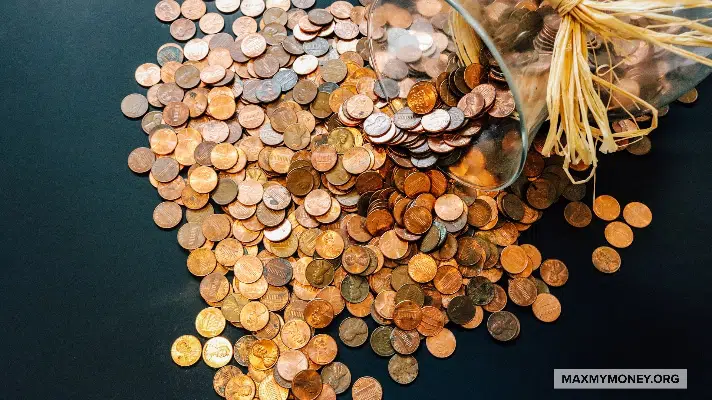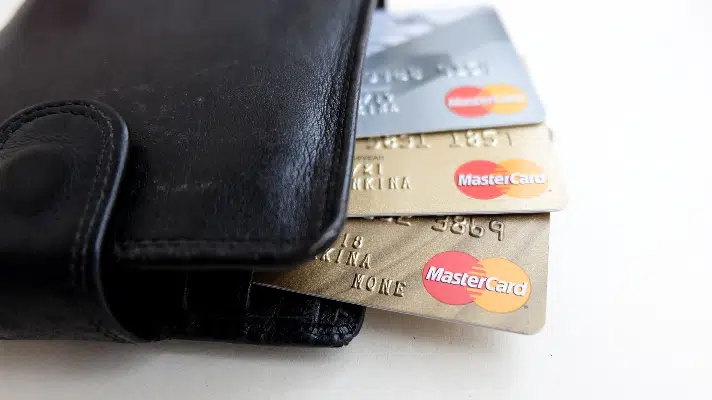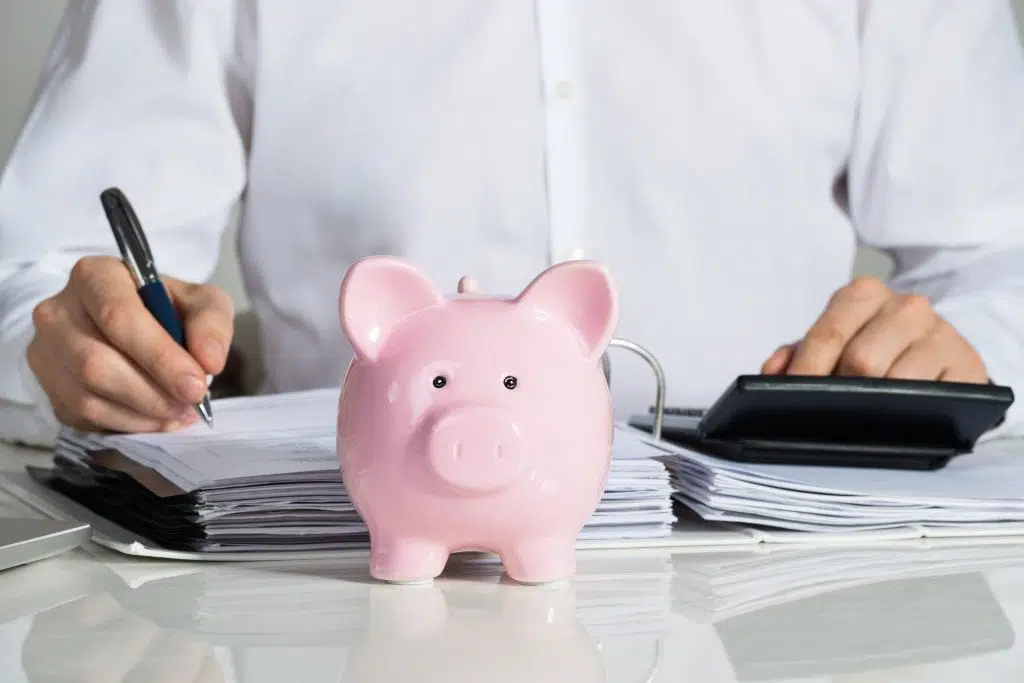Saving money is one of the most important things that you can do for yourself. Not only does it save you from spending your hard-earned cash on items that are not necessary, but it also helps to ensure that you will have enough money in the future to cover any emergency expenses.
This blog post offers 30 tips on saving more and spending less so that you can be prepared for your financial future.
Why is saving money important?
Saving money is important because it gives you a better chance of being prepared for your regular expenses as well as other expenses that may come up.
Saving money also protects you in the case of a financial emergency. If you start saving money every month then you will have a little bit of cash to fall back on when something unexpected happens. This means that you do not need to take out an expensive loan or be forced to rack up credit card debt to make ends meet. You’ll have a separate savings account ready to go.
Saving money can also give you the financial freedom to pursue your career and give you long-term security. This means that you do not need to stay at your job just because it pays the bills. If you save enough money then you can quit and work on transitioning your side hustle or dream that is more fulfilling without fear of falling behind financially. Having savings goals can allow you this freedom. Working a 9 to 5 is not the only way to live life.
Tip #1: Pay off All Debt as Quickly as Possible
Paying off all debt is perhaps one of the best ways to save money. Not only are you saving yourself from paying interest charges, but you are also freeing up your monthly cash flow for other things like savings or other financial goals.
It might not be possible for everyone to pay off their debts in full with a single payment, but it can help to make an extra effort on any loan payments that come due every month. If you have multiple loans then start saving extra cash and throw it at these accounts until they are paid off before making new purchases. This makes the most sense and is a better deal for you.
Tip #2: Cancel Subscriptions You Don’t Use
Most people have at least a few subscriptions that they do not need or use. Whether it is cable television, gym memberships, Netflix, an Audible subscription, etc., canceling these services can save you hundreds of dollars every year without having to cut out anything important. When you initiate the cancellation process, sometimes the company will give you an even better deal on the price. You can take full advantage of this great deal if you want.
Even if the service only costs about $13 per month, this will save you thousands over time and give your bank account some room to breathe when put towards other things like savings goals or building your emergency fund. Make sure to cancel subscriptions that you have not been using.
Tip #3: Stay Away From Name Brand Products
Most name brand products are more expensive than their generic counterparts. This is because companies charge a premium for the convenience of having an already established marketing campaign and that’s usually it. When you pay for a brand name, you’re usually buying just the name.
Ready to make your first budget?
Enter your email and get the free template
This means that you can save thousands over your lifetime by buying generics or shopping at discount retailers like Aldi, Dollar General, Dollar Tree, etc., instead of always going to market leaders like Target. By making these small changes, you will begin to see your savings account grow.
Tip #4: Double-Check Your Insurance Rates
You probably already know that it is a good idea to save money on financial products like your home and auto insurance.
Allstate offers its customers the ability to save money on car insurance using a program called Milewise. You are charged a per day rate and then a per-mile rate. I personally use this as I only drive about 35-40 miles per week. I went from paying about $100 per month with an “unlimited miles” policy to about $30 a month with the pay-per-mile policy. This has helped me continue adding money into my savings accounts.
With homeowners insurance, there are also ways for customers with little or no claims history to save money. Many providers will offer discounts if the homeowner has a monitored alarm system that alerts the policy or a monitoring company when triggered.
Tip #5: Avoid Eating Out as Much as Possible
Eating out is one of the biggest ways to spend money on the day to day. There are a lot of quick money saving tips here, whether it involves bringing lunch from home or going grocery shopping instead of having food prepared by someone else.
How I make $11,000 per year renting out my spare rooms?
Get access to my FREE guide now.
If you absolutely have to eat out while at work, try walking over there on your lunch break instead of opting for delivery service, which will add an extra fee onto what you spend. If possible, bring leftovers from dinner into work so that you can eat them again rather than spending more money at restaurants each day. Bringing your lunch from home will help you immensely achieve your savings goal.
Tip #6: Take Advantage of Discounts
There are a lot of ways to save money that people do not think about because they seem too good to be true. However, these types of discounts exist and can save you hundreds or thousands in the long run depending on your spending habits.
Whenever you go shopping, take note of whether or not that store is offering any discounts, and whether you qualify. For instance, many people forget that it is possible to save money on their prescriptions by filling them at a cheaper pharmacy.
When online shopping make sure to use a browser extension like Honey to find the best deals. Honey automatically finds the best deals on the internet while online shopping.
Tip #7: Have a Successful Budget
Having a budget is important when you start saving money because it allows you to take control over your spending and will give your bank account some breathing room.
If you are not currently on one, make sure that you create one and start following the rules as soon as possible! This will give you complete transparency into how much money comes in at all times while giving yourself some wiggle room with spending if need be.
I have a simple budget template you can use for free here.
Just remember that having too many “allowances” can end up costing more than they save when trying to save for something big like vacations or a down payment for a house.
Related reading: 20 Budgeting Tips For Beginners
Tip #8: DIY as Much as Possible
Another way to save money is by doing as much of the work yourself rather than hiring someone else. For example, instead of having a professional come and clean your carpets every time they need it, you can save some serious cash by renting an industrial sized carpet cleaner and cleaning them on your own once in a while. You know those gigantic things at the grocery store?
If there are any repairs that need done at home or around the office such as replacing light fixtures or fixing leaky faucets you can read a handyman blog or video that will teach you all basic home repairs. As you become more comfortable around your house this will become an important money saving practice.
Tip #9: Buy Used Items Whenever Possible
One of the easiest ways to save money is by taking a look at your desired purchases from an entirely new perspective. Instead of looking for that perfect item, think about how long it will last and what kind of condition it may be in after you purchase it.
For instance, if you are thinking about purchasing a used car instead of a brand-new one with all the bells and whistles there are so many factors to consider such as mileage on the vehicle or any cosmetic damages that have been repaired over time.
However, these types of vehicles can save hundreds off the price tag when compared to their newer counterparts simply because they do not come with as much added value from factory options which cost more each year even though those features might never get used.
Clothing and books are two other categories where it might be more cost effective to buy used. Unless you are looking for something specific, it can save a lot of money to buy gently used items instead. Amazon offers almost every book in a used form, sometimes for as low as $3. Impulse purchases are not good but a $3 book once in a while won’t hurt your savings goals.
Tip #10: Look Into a Cash-Back Credit Card
One way that many people save money without even realizing it is by taking advantage of their credit card perks! If your credit card offers cash back rewards then use it whenever possible to save some extra dollars on top of your savings from other tips outlined in this blog post.
As long as you pay off any purchases made with the card each month so that you do not accrue interest charges, using one or two cards exclusively for these types of payments might be an easy way to save hundreds every year. I do this and all my rewards go right toward my savings goal.
Tip #11: Cut Back on Spending at the Grocery Store
One of the most common tips to save money is by planning your meals ahead and sticking to them once they have been written down no matter how good something looks at the store. One of the best money saving tips my Mother taught me was it’s never the right idea to go grocery shopping while hungry.
If you know you are prone to buying extra things you don't need at the store, utilize the delivery and pickup options most grocery stores offer. This alone bolsters my savings by thousands every year.
Tip #12: Plan Ahead for Major Purchases
One of the biggest mistakes that people make when trying to save money is by spending it on things they didn't plan for ahead of time. If there are any big ticket items in your future such as a car or home renovation project, try contributing toward your savings each and every month. I know home costs can be a lot.
Saving even just $50 per paycheck can add up quickly, which means you might actually get closer than expected before something needs replacement. This is being proactive with money and having a spending plan, something I encourage everyone to do.
Another thing that many overlook when saving for these types of purchases is having an emergency fund set aside simply because life happens and sometimes we do not have enough saved if anything unexpected pops up out of nowhere. Try and save at least $500 initially and then add a little more each time you save up a minimum of $1000. This $1000 number is common financial advice you’ll hear from most.
Tip #13: Pay Your Monthly Bills on Time
It might seem like a simple thing to do, but if you do not make sure that your energy bill and other utility bills are all paid on time without exception, it can really cost in the long run due to high late fees which will eat away at your savings account.
If this is something that has been happening often or even just occasionally throughout the year, take some time out of your schedule at one point every month and set aside enough money so there will be no excuse when it comes down to paying bills because they could end up costing hundreds more than expected if left unpaid until after their cutoff date.
Tip #14: Make Sure to Have a Clear Savings Plan and Goal
One of the best ways to save money is by setting clear savings goals and sticking to them! Figure out how much you want to save each month or year, then take a look at your income and try to figure out where that amount will come from.
By saving just half of every paycheck consistently over time it should not take too long in order for someone who makes $2500 a month to save $25,000 which could then be put towards buying a car or home. This is a great savings goal to have.
Tip #15: Track Your Spending
It's all too easy to save money if you know how much is being spent. When people have no idea where their cash is going, it can be extremely difficult to follow a savings plan because spending seems inevitable and out of control which means a savings account might never see the light of day!
One way to help keep track of everything without having to write down every single purchase made throughout the month or year would be through using an app on your phone such as Mint that keeps track by categorizing things into different areas like groceries, restaurants, etc.
This will allow for some wiggle room when trying not to spend more than what was allocated towards certain expenses but still provides enough clarity for anyone who may need pinpoint accuracy in order to save up quickly for something.
Tip #16: Save First, Then Spend
Saving first before spending anything else means being able to have extra cash set aside so when an unexpected expense arises from out of nowhere due to car repairs or medical bills, there will not only be enough saved up but also some wiggle room just in case more than one big ticket item pops during a specific time period.
Tip #17: Buy In Bulk
This one can save a ton of money and time as well because if certain things like groceries and toiletries are purchased in bulk, then there will be no need to make trips back to the store once they run out or purchase more within a specific timeframe.
By purchasing items such as paper towels, trash bags, or napkins at once from Costco for example- along with buying other household goods such as shampoo and conditioner separately but together during that same trip could save up enough money so it would not seem necessary to go through stores each week just trying to pick up whatever random item might have been forgotten about before heading back home.
Tip #18: Use Automatic Payments to Put Money Into Your Savings Account
Putting money into savings automatically means not having to worry about forgetting or even feeling guilty for spending it on something else. As long as there are no fees associated with the account, then simply save up enough so that your direct deposit hits your checking account an automatic transfer can be set up in order to save every month without fail.
Tip #19: Start Savings for Retirement as Early as Possible!
Once a person has reached the age in which they are employed full-time, then it is important to save up for retirement as much and as early as possible.
This will help with being able to save enough because the government is not going to save you with their failing savings plan (social security).
Tip #20: Take Advantage of Your 401(K)
If there is a company that offers matching funds for the money deposited into any retirement savings account, then take advantage of it.
For example, if someone deposits $100 per month throughout each year and their employer matches every dollar that is $1200 per year you’re receiving a free savings contribution from them.
Tip #21: Put Your Tax Refund Into Savings
If a taxpayer is expecting to receive back money that was taken out in taxes throughout the year, then save it up instead of spending it on unnecessary things. Start saving these refund and they will add up over the years. The average tax refund is over $2000.
Tip #22: Save Up Spare Change
This one may not save up a lot of money, but it can add up over time.
For example, if someone starts saving their spare change by putting all coins into any type of jar or container once they are paid for-meaning only taking the amount that is needed to purchase items at stores and then depositing them right away into some kind of coin bank instead of keeping loose change on hand throughout the week-and doing so every single day until completely full means having around $40 saved up after just six months!
That turns out to be almost 500 quarters which could turn into two brand new $20 bills each year without even thinking about how much was actually put back in order to do so This would equate to another 100 $20 bills each decade which would really build up to save for something much greater once reaching the age of retirement-such as a new car, etc.
Tip #23: Wait a Week Before Deciding to Make Large Purchases
It is always a good idea to wait a week before deciding to make any large purchase.
If you're looking at a sweater or a new gaming system, even if your brain is telling you to buy it right that second, sleep on it and decide if it's really worth the money, especially if you are trying to cut back on spending. Remember, the idea is to prioritize savings, not anything else.
Tip #24: Set a Spending Limit for Gifts
When buying gifts for people during the holiday season, set a spending limit.
Everyone loves gifts but the time spent with those important people is far more important than any possession.
Tip #25: Separate Your Wants From Your Needs
Separating the wants from the needs is another tip that can add to your savings.
For example, if there are items you want to purchase but do not necessarily need right this second-such as a brand new car or expensive handbag because it seems like everyone has one. Don't do it. As hard as it may be, save up the money to be able to purchase them in a few months, if not a year or two. This will save enough money for other things that really are necessary such as groceries and bills instead of having extra expenses due to unnecessary purchases-or even worse, going into debt because of it!
Tip #26: Avoid Using Credit to Pay Bills
If you have any bills set up on autopay through the use of credit cards, make sure to avoid doing so if you don’t pay off the balance in full every month.
It can save money over time by avoiding interest rates and other charges that may come with getting approved for a new card just to pay off monthly payments. Instead, connect your checking account and have automatic payments come from there instead of using credit. This will save up more cash flow throughout all accounts which is always beneficial when it comes down to saving each month as well as year after year.
Tip #27: Use Credit Cards as Little as Possible
Try to use credit cards as little as possible unless there is a pressing emergency and there is no other option.
It will help your savings over time by avoiding interest rates and other charges each month which can add up rather quickly.
This type of spending should only be used when needed instead of having something put on a credit card just because it’s easily accessible at the moment. If not careful, these types of accounts could end up being overdrawn due to a lack of funds in checking without realizing how much was spent throughout this process since most fees associated with doing so happen unexpectedly unless creating an action plan ahead of time before any expenditures.
Tip #28: Consider Refinancing Your Mortgage
If you are planning on staying in your home for the long term, refinancing the mortgage can be a good idea to bolster your savings.
This tip can save hundreds of dollars of extra money each month which means thousands added to accounts throughout a year if not more depending on how quickly it is paid off after doing so. It would be an excellent idea to check with different lenders since some may have better offers than others-while helping save up money overall when going through this process!
Tip #29: Work Out at Home
Instead of that boutique gym or yoga studio, consider exercising at home instead.
I have used the Peloton app as well as Cycle Cast and Equinox +. All these offer live as well as on-demand classes similar to any other streaming services. They all have their perks and downsides.
Tip #30: Carpool to Work And/or School
If possible, save up money by carpooling to work or school instead of paying for gas every day.
With gas prices increasing it would be smart to go with a coworker.
How I make $11,000 per year renting out my spare rooms?
Get access to my FREE guide now.






